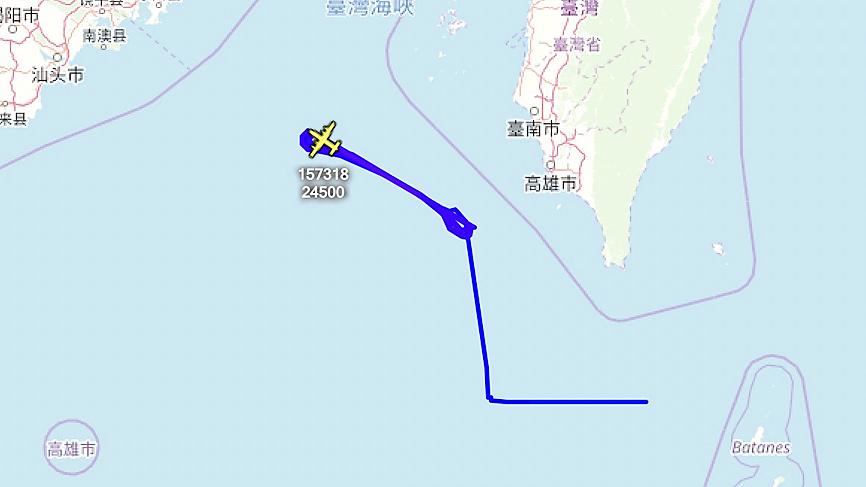A Twitter account that tracks military aircraft movements has indicated an increase in US military activity near Taiwan, coinciding with an increase in Chinese military activity in the area.
Planes from the US Seventh Fleet have been sighted frequently above the South China Sea in the past several days, and a US Navy EP-3 reconnaissance plane was seen flying close to Taiwanese airspace southwest of Kaohsiung yesterday, according to posts by the Twitter account Aircraft Spots.
The EP-3 was seen circling above the same area, Aircraft Spots said, adding that other planes from the fleet were seen in the past few days near the Philippines, where they appeared to be gathering information on Chinese vessels in the area.

Image from the Aircaft Spots Twitter account
The Ministry of National Defense said that its surveillance network is capable of monitoring the seas near Taiwan and that it always monitors the movements of aircraft and vessels near the nation’s territory.
Aircraft from the Chinese People’s Liberation Army Air Force have been spotted near Taiwan on four occasions in the past six weeks — Feb. 9, 10 and 28, and March 16.
The most recent sighting was the first time a Chinese military aircraft had approached Taiwan at night during a drill.
Following the Chinese drills on Feb. 10, a US MC-130J Commando II transport aircraft and two B-52 bombers flew over waters west and east of Taiwan.
The US last month also flew P-3 Orion maritime surveillance aircraft over waters south of Taiwan, and on Feb. 16 sailed a warship through the Taiwan Strait.

AIR SUPPORT: The Ministry of National Defense thanked the US for the delivery, adding that it was an indicator of the White House’s commitment to the Taiwan Relations Act Deputy Minister of National Defense Po Horng-huei (柏鴻輝) and Representative to the US Alexander Yui on Friday attended a delivery ceremony for the first of Taiwan’s long-awaited 66 F-16C/D Block 70 jets at a Lockheed Martin Corp factory in Greenville, South Carolina. “We are so proud to be the global home of the F-16 and to support Taiwan’s air defense capabilities,” US Representative William Timmons wrote on X, alongside a photograph of Taiwanese and US officials at the event. The F-16C/D Block 70 jets Taiwan ordered have the same capabilities as aircraft that had been upgraded to F-16Vs. The batch of Lockheed Martin

US President Donald Trump yesterday announced sweeping "reciprocal tariffs" on US trading partners, including a 32 percent tax on goods from Taiwan that is set to take effect on Wednesday. At a Rose Garden event, Trump declared a 10 percent baseline tax on imports from all countries, with the White House saying it would take effect on Saturday. Countries with larger trade surpluses with the US would face higher duties beginning on Wednesday, including Taiwan (32 percent), China (34 percent), Japan (24 percent), South Korea (25 percent), Vietnam (46 percent) and Thailand (36 percent). Canada and Mexico, the two largest US trading

GRIDLOCK: The National Fire Agency’s Special Search and Rescue team is on standby to travel to the countries to help out with the rescue effort A powerful earthquake rocked Myanmar and neighboring Thailand yesterday, killing at least three people in Bangkok and burying dozens when a high-rise building under construction collapsed. Footage shared on social media from Myanmar’s second-largest city showed widespread destruction, raising fears that many were trapped under the rubble or killed. The magnitude 7.7 earthquake, with an epicenter near Mandalay in Myanmar, struck at midday and was followed by a strong magnitude 6.4 aftershock. The extent of death, injury and destruction — especially in Myanmar, which is embroiled in a civil war and where information is tightly controlled at the best of times —

China's military today said it began joint army, navy and rocket force exercises around Taiwan to "serve as a stern warning and powerful deterrent against Taiwanese independence," calling President William Lai (賴清德) a "parasite." The exercises come after Lai called Beijing a "foreign hostile force" last month. More than 10 Chinese military ships approached close to Taiwan's 24 nautical mile (44.4km) contiguous zone this morning and Taiwan sent its own warships to respond, two senior Taiwanese officials said. Taiwan has not yet detected any live fire by the Chinese military so far, one of the officials said. The drills took place after US Secretary